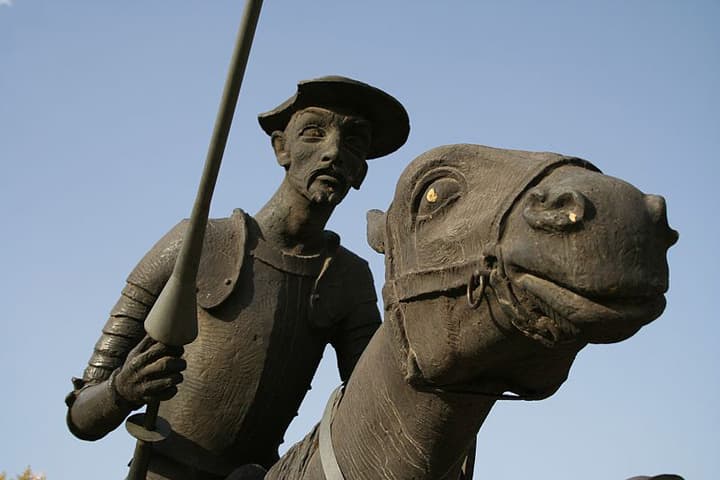Advertisement
The Enduring Appeal Of The Quixotic Cervantes
Resume"Don Quixote," and why the 17th Century mock epic of Cervantes still gets under our skin.

Four hundred years ago this year, in 1615, the Spanish writer Cervantes finished his great work "Don Quixote." Within months, he would die. But Don Quixote has never died. The mock epic of the ramshackle knight on his bony horse tilting windmills has been one of the most durable and massively popular literary works in history. George Washington read it. And Melville and Mark Twain. Picasso. Dostoevsky. My guest Ilan Stavans calls it a cornerstone of Hispanic culture, and of the modern understanding of the human condition. This hour On Point, Don Quixote rides again.
-- Tom Ashbrook
Guest
Ilan Stavans, author and cultural commentator. Author of the new book, "Quixote: The Novel and the World." Professor of Latin American and Latino Culture at Amherst College. Also author of "A Most Imperfect Union," "Gabriel Garcia Marquez: The Early Years" and "A Critic's Journey," among others. (@ilanstavans)
From Tom’s Reading List
Milwaukee Journal Sentinel: Ilan Stavans appreciates 'Don Quixote' as a giant astride two cultures — "Not only does Miguel de Cervantes' novel 'Don Quixote' (1605-'15) tower over Spanish literature like a giant windmill, it also can be seen as a turbine that powers Spanish culture. But the novel's kinetic energy doesn't stop at the Iberian peninsula."
World Literature Today: My Love Affair with Don Quixote — "We all dream of a different life. We all want to be someone else. Don Quixote is such an appealing character because he acts upon that dream. As a result, he is seen as a fool, imprisoned in his own self-made universe. But contrary to common wisdom, foolishness isn't the antonym of reason. One can be a wise fool as well as an insane genius."
Humanities: One Master, Many Cervantes — "I can’t think of a more rancorous translation surfeit, a fiesta of larger possibilities, than the multiplications in English of Don Quixote, by far my favorite book. It is an inexhaustible study of human frailties, an open novel about friendship, love, liberty and censorship, about pursuing one’s own dreams, about reading and mental illness, about class struggle, about the power of the imagination and the absurdities of old age, about choosing between a soldier’s and a writer’s life. It is, in my estimation, a secular Bible: everything about the so-called enlightened society is contained in it."
Read An Excerpt From "Quixote" By Ilan Stavans
https://www.scribd.com/doc/279731857/Excerpt-From-Quixote-The-Novel-and-the-World-by-Ilan-Stavans
This program aired on September 9, 2015.